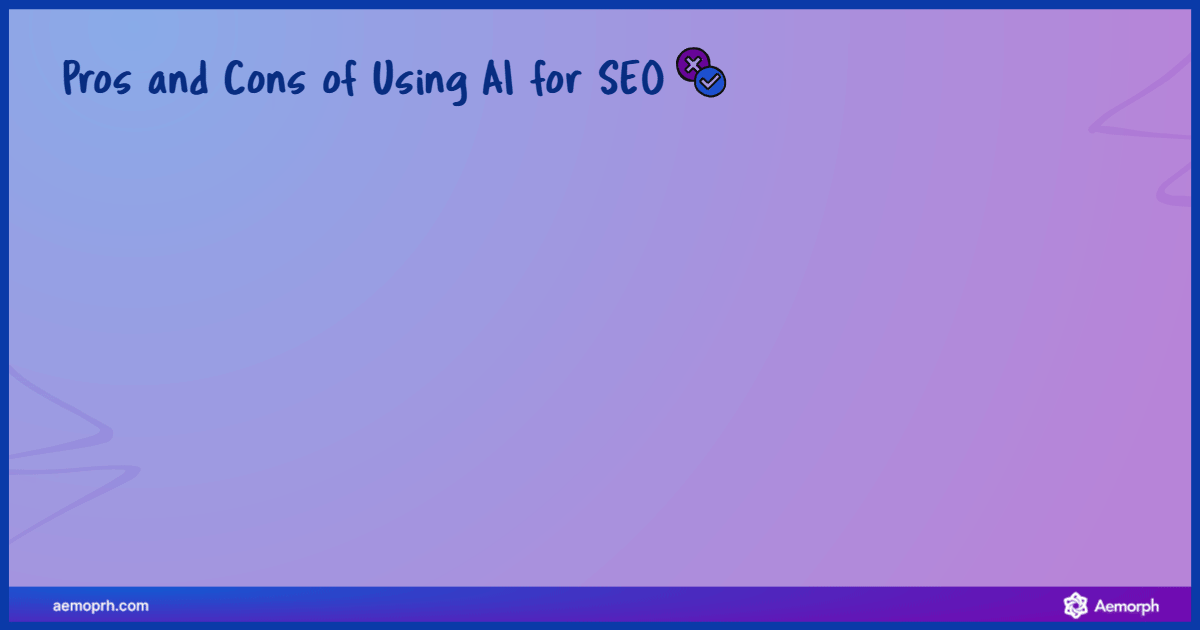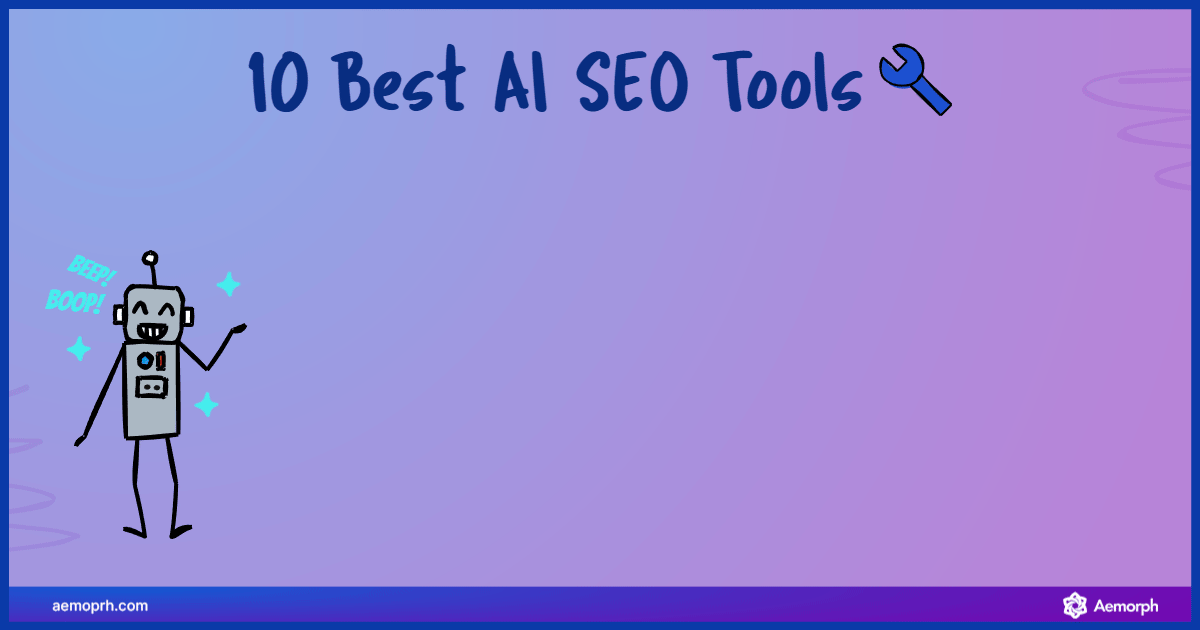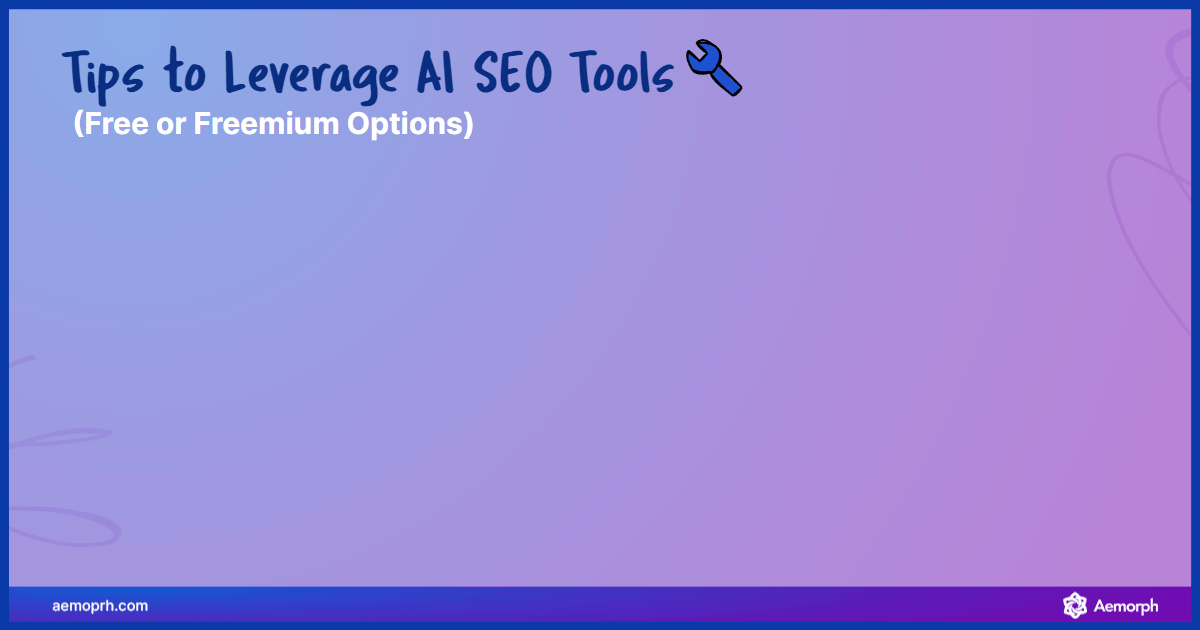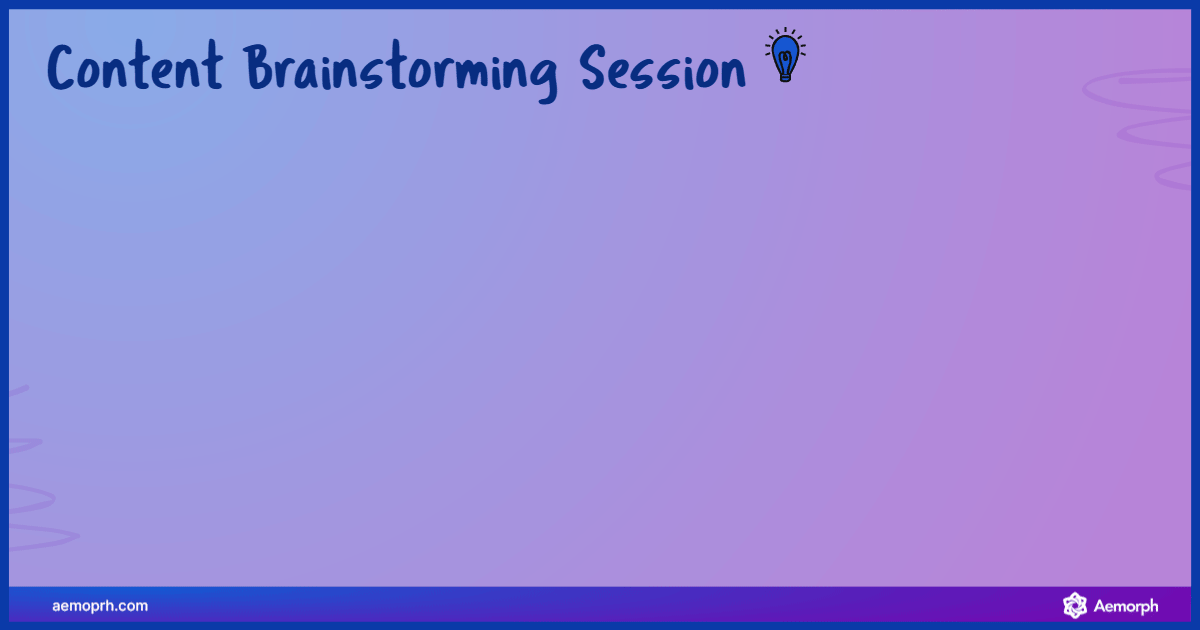Understanding the importance of AI SEO tools in today’s digital landscape is crucial. In this article, I’ve provided a detailed guide with practical tips on leveraging AI SEO tools to enhance SEO efforts.
Technology is taking the digital world by storm, and I’ve come to realise the immense potential of AI SEO tools. The fusion of artificial intelligence and content creation holds the power to transform search engine optimisation (SEO) for those who adopt AI SEO tools.
In this guide, we’ll break down what AI SEO tools are, how they work, and the benefits they bring to the table.
For example, Aemorph uses tools like AHRefs and SEMrush to analyse keywords, competitors, and websites.
AI SEO Tools: What Are They?

AI SEO tools are software apps powered by artificial intelligence, aiding content creators across the content lifecycle—idea generation, writing, editing, and more. In the SEO field, these tools become the secret weapons to outmanoeuvre the competition through precision, efficiency, and insight. They help automate repetitive tasks, provide valuable insights, and enhance overall content strategy. When it comes to SEO, AI SEO tools can:
- Conduct detailed keyword research using tools like Ahrefs and SEMrush to identify high-traffic and low-competition keywords relevant to your niche. Analyse keyword trends and search volumes to prioritise content topics. Use these insights to develop a content calendar and track the performance of your keywords to adjust strategies as needed.
- Optimise content creation by utilising JasperAI or GPT-4 by OpenAI to generate high-quality, SEO-optimized content quickly. Ensure the content is tailored to your target audience by integrating relevant keywords naturally. Regularly update the content to keep it fresh and relevant, and use A/B testing to determine which versions perform better..
- Personalize content for different audience segments. Use AI tools to analyse audience behaviour and preferences, allowing for more targeted and effective personalisation. Track engagement metrics to continually refine your approach.
- Utilise data-driven insights by using MarketMuse to align your content strategy with Google’s ranking factors. Apply data-driven insights to continually refine and adjust your SEO strategies for better performance. Set up regular reporting and monitoring to evaluate the effectiveness of your strategies and make data-informed adjustments.
Pros and Cons of Using AI for SEO:

Understanding the pros and cons of using AI in SEO is crucial for making informed decisions about incorporating these tools into digital marketing strategies.
Pros:
- Time-saving: AI SEO tools can generate content quickly, and perform keyword research and topic clustering in a fraction of the time, saving SEO professionals like me a valuable resource. Utilise the saved time to focus on strategic planning and other high-impact activities.
- Scalability: These tools can handle large volumes of content creation and optimisation. Leverage this capability to expand your content marketing efforts without proportionally increasing your workload.
- Data-driven insights: These tools can analyse data and provide valuable insights for SEO strategies. Use these insights to fine-tune your content and SEO tactics, ensuring they align with the latest trends and best practices.
- Consistency: AI-generated content can maintain a consistent style and tone. Ensure that your brand voice and guidelines are clearly defined and programmed into the AI tools to maintain brand integrity.
Cons:
- Lack of creativity: AI SEO tools might struggle with generating unique and creative content. Incorporate human input for creative elements and unique perspectives to complement AI-generated content.
- Limited understanding: These tools may not fully grasp context and nuances, potentially leading to inaccuracies. Regularly review and edit AI-generated content to ensure accuracy and relevance.
- Overreliance: Relying solely on AI SEO tools could impede human creativity and intuition in content creation. Balance the use of AI tools with human oversight to leverage both technology and human creativity.
- Cost: These tools can be pricey, particularly for smaller businesses. Evaluate the ROI of AI tools and consider budget-friendly alternatives or phased adoption to manage costs effectively.
Integrating AI into our SEO toolkit enhances content creation and SEO strategy, improving user experience and website performance.
10 Best AI SEO Tools

Leveraging AI SEO tools can truly be a game-changer, enabling companies to stay ahead of the competition and achieve higher search engine rankings. Below is a selection of top tools that improve our SEO strategy, which you can seamlessly incorporate:
Semrush
Semrush is a comprehensive SEO tool that uses AI and machine learning algorithms to provide keyword research, backlink analysis, content optimisation, and more. This tool also offers a site audit feature that identifies technical issues and suggests improvements for better search engine rankings.
Ahrefs
Ahrefs is another popular SEO tool that utilises AI technology for keyword research, backlink analysis, and content optimisation. It also offers a Content Explorer feature that allows users to search for popular topics and competing articles in their niche.
JasperAI
JasperAI is an AI-powered content generation tool that can create high-quality, relevant content in just a few seconds. This tool uses natural language processing (NLP) to generate content that is optimised for search engines and tailored to your desired audience.
SurferSEO
SurferSEO: Some of its best features include advanced keyword research, on-page analysis, and competitor analysis, where you can easily identify the most relevant keywords and optimise your content to rank higher in search engine results. Surfer SEO provides valuable insights and recommendations to improve your content’s performance and drive more organic traffic to your website.
Frase
Frase: Frase is an AI-powered content optimisation tool that uses NLP technology to analyse your website’s content and suggest relevant topics and keywords to improve search engine rankings. This tool also offers a feature called “Answer Engine,” which generates answers for common questions related to your industry, making it easier for your content to rank in
Grammarly
Grammarly has natural language processing capabilities. It assists in perfecting the grammar and style of content, leading to increased readability and improved SEO performance. Grammarly helps you optimise your SEO content by ensuring error-free and well-written content that becomes more engaging and appealing to readers and search engines.
GPT by OpenAI
GPT-4 and 3.5 by OpenAI: GPT by OpenAI is an advanced language prediction model that revolutionises content writing. With its ability to generate human-like text, it empowers the creation of SEO-optimized articles, blog posts, and product descriptions at scale. By harnessing the capabilities of GPT-4 and 3.5, content writers can effortlessly generate exceptional and captivating content, resulting in significant time and effort savings. This revolutionary advancement has transformed the landscape of content writing, making it more efficient and effective than ever before.
MarketMuse
MarketMuse helps develop content strategies that align perfectly with Google’s ranking factors. It ensures content is always competitive in SERPs by boosting the chances of higher visibility and organic traffic. Its features include comprehensive topic research, content optimisation recommendations, and competitive analysis, all aimed at improving your content’s relevance, quality, and performance.
Moz Pro
Moz Pro: Moz’s suite of SEO tools uses machine learning to track search engine rankings, suggest actionable insights, and identify SEO opportunities hidden within the website’s performance data.
LinkWhisper
LinkWhisper: This AI-powered tool automates internal linking, improving website navigation and the user experience. It analyses your content and suggests relevant internal links to boost SEO performance, all with just a few clicks.
Dall-E
Dall-E: Dall-E is an emerging AI tool that uses GPT-3 technology to generate realistic and high-quality images based on text descriptions. This innovative tool can be used for visual content creation, making it easier to produce eye-catching graphics for social media posts, blog articles, and more.
Tips to Leverage AI SEO Tools (Free or Freemium Options)

Tip #1: Free Trials of Premium Tools: Take advantage of free trials to test premium features and assess their usefulness for your specific needs with premium tools such as Ahrefs, SEMrush, and Moz. Use this period to test features like detailed keyword research, backlink analysis, and site audits. Assess their usefulness for your specific needs by conducting a few real-world tests and comparing results to your current tools.
Tip #2: Limited Free Features: Many paid tools offer scaled-back free versions with functionalities like site audits, basic keyword research, or backlink tracking, which can significantly impact your SEO efforts. Maximise these free features by integrating them into your regular SEO audits and strategy planning sessions.
Tip #3: Free AI SEO Tools: Make the most of free AI SEO tools like Google’s Keyword Planner for detailed keyword research, Ubersuggest for keyword ideas and competitive analysis, Keyword Surfer for real-time keyword data, and AnswerThePublic for searching for popular questions related to your niche. Use these insights to guide your keyword strategy and optimise content effectively.
Tip #4: Content Marketing & Reviews: Write reviews or create valuable content about AI SEO tools. Share your experiences and results on your blog or social media platforms. This might attract tool providers, potentially leading to partnerships or complimentary access in exchange for promotion. Engage with the community by responding to comments and questions about the tools, building your authority in the field.
Tip #5: Student Discounts & Educational Resources: Look into student discounts or free access options through educational institutions offered by some AI SEO tool providers. Providers like SEMrush and Ahrefs often offer special plans for students, which can be accessed through your school’s IT department or student services. Take advantage of any free training or webinars offered by these providers to maximise the value of the tools.
Tip #6: Content Creation Collaborations: Partner with businesses or agencies that use AI SEO tools to create content. They might allow you to leverage their tools for your project or offer insights into their SEO strategies network at industry events and online forums to find potential collaboration partners.
Tip #7: Start Small & Scale Up: Begin with affordable entry-level tools offering essential features like Ubersuggest or the basic plan of Moz. Focus on essential features such as keyword research and site audits. As you gain comfort and measure their impact, consider upgrading to more robust packages. Regularly review your tool usage and ROI to ensure you get the most value as you scale up.
Tip #8: Prioritize Long-Term ROI & Project Scope: Look beyond the initial cost and assess the long-term return on investment. Consider how the tool integrates with your project’s scope and whether its projected benefits justify the expense. Track key performance indicators (KPIs) over time to measure the impact of the tools on your SEO strategy.
Tip #9: Choose Scalable Solutions: Opt for AI SEO tools that can grow with your needs and offer scalable solutions, such as SEMrush or Ahrefs. Look for tiered pricing models or features that unlock as your website traffic and SEO strategy expands. Plan for future growth by considering the scalability of the tools you choose. Ensure they can accommodate increased usage and advanced features as your needs evolve.
Tip #10: Focus on Workflow Integration: Understand that AI SEO tools are not a magic solution but a powerful addition to your workflow. Set achievable goals and focus on how you can integrate these tools into your daily routine for maximum benefit. Create a workflow chart to visualise how each tool fits into your daily tasks and SEO processes.
8 Clever Techniques for Boosting SEO Using AI Tools
Now that you’re familiar with some AI SEO tools, let’s go deeper into the topic. Utilising tools effectively can make your SEO process more efficient and deliver better results.
Here are eight brilliant ways to get the best out of AI tools and improve your SEO game:
1: Semantic Enrichment.
Weave in semantically linked keywords and topics. AI tools can offer helpful suggestions for entities, attributes, and values that may not have been on your radar, enriching the contextual relevance of your content.
2: Learning of the power of long-tail magic.
Utilise AI tools for an extensive review of long-tail keywords – those specific three or four-word phrases relevant to your niche. Despite their lower search volumes, these keywords have stronger intent, high conversion rates and face less competition. Stay ahead with cutting-edge AI-powered tools like Ahrefs or Semrush, offering advanced interfaces that break down search data, revealing precious long-tail treasures. Think of examples like ‘best organic skincare for sensitive skin’ or ‘eco-friendly pet supplies near me’ catering to specific needs and boosting your SEO strategy.

3: Content Brainstorming Session

These tools can help you brainstorm compelling topics and catchy headlines efficiently. Simply input a few seed keywords and watch as they generate many catchy headlines and compelling topic ideas, some of which you might never have thought of on your own. Remember, the power of AI is to guide and inspire, but the final creative direction is up to you.
4: Write Like a Pro (Almost)
Say goodbye to staring at a blank cursor. Crafting the first draft of your content can be easier with AI. Tools like Copy.ai can assist you by creating initial content that is not only on-topic but often quite coherent and informative. However, remember, AI is your sidekick, not your replacement. Inject your brand’s unique voice and personality to make the content truly shine.
5: Personalise for Peak Engagement
One-size-fits-all content is a recipe for disengagement. Leverage AI SEO tools to analyse search intent and understand the “why” behind user queries. This allows you to tailor your content to their specific needs, be it informative guides, product descriptions, or service explanations. This approach ensures that your content meets the needs of your audience and enhances their overall experience.
6: Automated Content Optimisation
Gone are the days of keyword stuffing! AI tools like SurferSEO, WriterZen or Frase provide data-driven suggestions to optimise your existing content. These include meta tag tweaks, internal linking recommendations, and keyword density adjustments for maximum readability without sacrificing SEO best practices. Remember, these are suggestions, not gospel. Tailor them to your specific content and audience.
7: Fact-Check Fanatic
Accuracy and credibility are vital in the content world. An AI SEO tool can be a game-changer for fact-checking, utilising tools like Copyscape or Originality.ai to ensure your content is authentic and free of plagiarism. Uphold digital integrity and establish trust with your audience.
8: Visual Appeal Amplifier
AI SEO tools enhance visual content. Services like DALL-E 2, Canva, Adobe Spark or Visme can craft images and infographics tailored to your SEO requirements. Engaging infographics, charts, and diagrams not only enhances user interaction but can also secure a prime position in Google SERPs.









